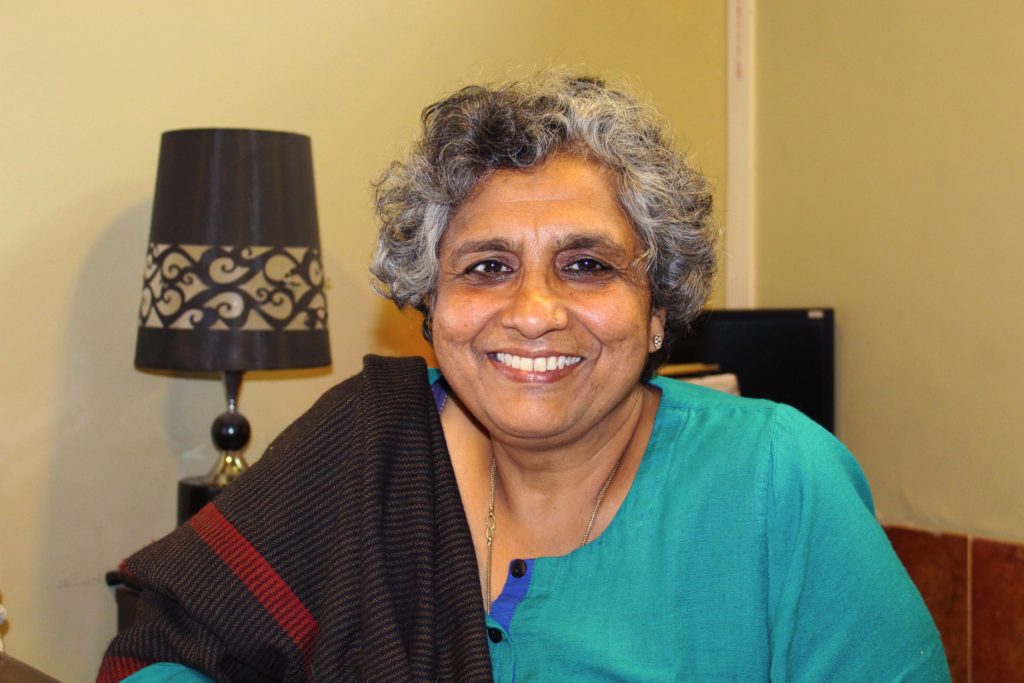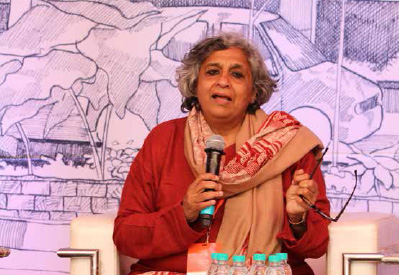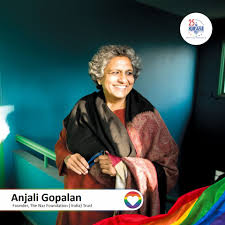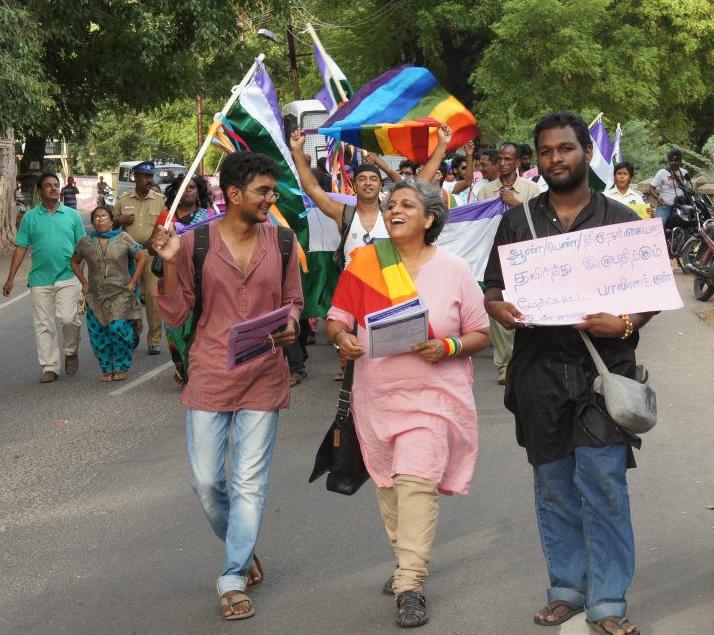
Anjali Gopalan, is a prolific and dedicated human rights and animal rights activist. Founder and director of Naz foundation (India) trust, she has held and extended the baton of socio-political change for equal representation of people driven to the periphery by exclusionary norms and stigmatized topics like HIV epidemics. She has been actively involved in the pursuit of decriminalisation of section 377 and in fact, Naz was one of the first foundations to file a PIL against it. Anjali is the recipient of the commonwealth award for her unfailing dedication to work for the marginalized communities such as the LGBTQ+. She also has been honoured as a candidate shortlisted for the Nobel Peace Prize. An environmentalist and a passionate lover of animals, we can never be able to encompass her in enough words but we do really hold her in highest regard. We heartily welcome you ma’am.
Kunal: It is no secret that you’ve done unprecedented work for the society, especially for the minority and marginalized people’s rights. Be it legal, social or cultural, you’ve taken upon many challenges. I want to ask you, what was your motivation for taking on these issues (any specific incident that made you take on the resolve to bring a change)?
Anjali Gopalan: For section 377, yes. I think many small things kept happening while we were doing our work. But I think what really edged us on was when I started doing a lot of counselling for families. This one time there was a young man brought in for me to try to convince him to become straight which obviously didn’t happen with me. So, the family forbid this boys from talking to me again. The sheer number of such cases amazed me. Interestingly, there was a case, around the year 2000, where a family insisted that the boy should get married no matter what his sexuality. I didn’t think about until a month later when the young man came back looking absolutely ghastly and we realized that the family had taken them to another major hospital where he received shock therapy in order to make them straight. That is when we decided that something had to be done because this is really beyond belief and ridiculous. Lamayaz (not sure about this) collective also was looking to change the situation so that’s how we decided that this is something we really need to take on otherwise things are not going to change at all and the fact that homosexuality was criminalised meant that a large number of people in this country didn’t have the rights that everyone takes for granted.
Kunal: I think ma’am, in every Civics/Political science textbook, everyone must have come through this maxim at least once- “justice delayed is justice denied”. Your work in so many distinct yet interconnected sectors of the society, is very inspirational. However, your journey as rewarding as I hope it is, must also have been very frustrating. If you look back now, is there a moment in which you felt that the social forces were so overwhelming that your resolve to bring a radical change might be subsumed and thus suppressed?

Anjali Gopalan: I think when you do this kind of work you understand that there are going to be many blocks in your path. Society is not going to accept things so easily but, if you decide to take something on like this I think you have to understand that no matter what blocks are thrown your way, you have to challenge it, fight it and deal with it. I can’t say that is a cake walk. I suppose you also realize that if you truly believe in working, which is which was our philosophy, towards an equitable society, there is no option to walk away from it just because of frustrating blocks that one might be experiencing. So I think when we do this work, I understand that yes this can happen, but there’s no reason for us to give up home otherwise what’s the point in doing what we’re doing.
Kunal: You’ve extensively engaged with treatment and counselling of HIV patients both in the US and in India when you decided to start NAZ. Since time immemorial, venereal diseases like HIV have been viewed as a consequence of a cardinal moral transgression that the society condemns. In light of this, the stigma of the disease becomes even more heightened in the case of the LGBTQ community because it makes a convenient reason for censuring their “aberrative” expression of self. How do you think this has affected the mental health of the patients from the community?
Anjali Gopalan: It’s interesting how in the early 80s HIV was known as Gay cancer and called GRID (Gay Related Immune Deficiency). In the West, it was definitely seen as a disease unlike India because in this country majority of the cases (87%) were a result of heterosexual transmission. However, then homosexual HIV positive patients were doubly stigmatised. Number one, HIV itself is highly stigmatised due to huge moral connotation whether you straight or not. If you have HIV, you’re judged as immoral because you stepped out of your marriage or that you’ve had extra marital relationships. This is why people with HIV got judged. So, the same thing happened if you were from an LGBTQIA community. Not only did people think negatively of people from this community, what makes it worse is that, because homosexuality had been criminalised people did not feel comfortable about accessing healthcare facilities. They were not open about talking about themselves, their sexuality, what they’re feeling, what they are going through. In many cases, there was an abundance of people blaming themselves for not being good. I remember, in the first few years of our work, when I used to reach out myself, it used to break my heart so many times because I had young men ask me “is there any medicine to make me feel differently?” Imagine going through this in life where you think the way you feel is so wrong. This clearly has an impact on mental health in a big way.
Kunal: Since HIV is a disease closely related to the act of intimacy (although we understand that it can be transmitted from other ways as well like blood transfusions), in consulting a medical professional, one would have to betray their sexuality. This process might also push a lot of people to come out openly as Gay, Lesbian, Bisexual (…) either against their choice or sooner than they would want to (especially to their family). Do you see a shift in the response of the medical community as well as the claiming of a particular orientation by the patient?

Anjali Gopalan: You know initially when we started the work, I remember, doctors used to tell me- ‘why are you wasting your time, what’s the point and all this for people who are HIV positive, why?’ So, the other thing I also heard was “don’t we have more important things in this country that you are wasting time on gay people.” But part of the problem is of course our own homophobic attitudes towards the community as well as to HIV. Our own negative connotations about it. But I also think professionals have not been trained. In the training, there is no component around working with any kind of marginalised communities and all of this has to do with our own attitudes. So, unless we work on our own attitudes, nothing is going to change. The medical profession is a reflection of society at large and why would they be any different? I know, for example, doctors are not trained to look at specific infections which may impact gay people. So initially at least it used to be awful but, over the years many NGOs and community based organizations have worked with healthcare professionals so we do see a change in attitudes and we do see a change in how doctors are today treating people from the LGBTQIA community. I think the greedy capitalization of the discourse of sexuality in many ways has helped this. But, many doctors still openly advertise conversion therapy, so it’s not to say that everything has changed overnight. It’s a long process. You still have doctors who are extremely homophobic. And the biggest problem is that we have families trying to make gay people straight and these medical professionals prey on them. So, that is still going on and there is a lot of work to be done to bring about change in attitudes. But, I also think we need strong laws which will ensure that people don’t behave in this exploitative manner.
Kunal: There is a plea to consider same sex marriages in the “special marriage Act” passed in 1954 (hearing scheduled in Delhi High Court for January 8,2021). Considering the recent backlash that Tanishq faced for airing an advertisement that shows a situation well sanctioned by the law, particularly this act, do you think winning the legal battle would bring any material change in the framework of the society that is becoming more intolerant each day.
Anjali Gopalan: I think the laws need to change. I think people have the right to get married, if that’s what they want. Justice is the same for all citizens in this country, so on what basis are you denying this right to some people versus others? I don’t think that once that does happen, attitudes will change, but at least it’s a protection and at least it will allow people who want to get married, to get married. I think the biggest push back is going to be around marriage, that’s one thing that everybody comes together on for some reason. But I feel what is more important is, and many don’t agree with me on this, to try and get an anti-discriminatory law in place which will say that you cannot discriminate against anyone on any grounds whatsoever. I think that is something I feel will have better effect because today you have to fight for marriage tomorrow you will have to fight for abortions. We should ensure that everybody has access to all rights that are available in this country. Why should one set of citizens be denied one set of rights?
Kunal: We see Naz has been actively involved in shelterwork and also educational campaigns for children. Childhood is the time when a person internalises a lot of statements that one acts out or believes in during adulthood, and the education through sanctioned textbooks either deliberately endorses or deliberately omits certain worldviews. Since you’re closely connected with the process, how do you ensure that there is a transmission of holistic and unbiased knowledge that would (we hope) enable children to question the bianaries and stereotypes attached to them- of both gender and sexuality?

Anjali Gopalan: In the work we do, that’s included in the sessions that we provide to young people. But having said that, this is no response to an issue like this. NGOs or community based organizations or individuals can only work in a very limited fashion on an issue like this unless it becomes a part of the curriculum. So unless we make sex education a part of a our school curriculum, we’re not going anywhere with this. We must have age appropriate information on these issues that young people go through. We are still not talking openly about anything like this and we are not even sharing information that young people need to protect themselves. We don’t even want to talk about sexual abuse and UNESCO conducted a study and found out that a horrendous number of children in this country are exposed to sexual abuse. Unless the government and unless the authorities are not serious about this I think what groups like NAZ and others do can only be a drop in the ocean. We need government to step in to upscale it and we need the government to understand the importance of this kind of education for our young people. I have had many bureaucrats tell me that this will make our children promiscuous and how children are not going to be able to control themselves. We have to make them realize that they grew up in a different time when they did not have access to the internet and children now do and this is all the more reason for us to ensure that we give them this information about respecting differences.
Kunal: Career planning for women is also a dedicated endeavour by Naz that helps women carve out an identity for themselves free of the social roles excepted out of them especially in rural areas. We would love to know how the response has been to this program- from women yes but also from their families.
Anjali Gopalan: When we first started this program, I was really skeptical and I didn’t think it would work. But, since we were not being able to bring down infection rates, we need to look at HIV prevention from a different lens and I was amazed at the response from these young women. We obviously can’t work with young women in isolation, so families have been very much a part of this process. We had to convince families and work very closely with families to allow the girls to firstly, play game and to do the kinds of sessions that we were doing with them. Secondly, get training for skills development and then actually working in organizations like Standard Chartered etc. Therefore parents had to wrap their heads around concerns like “is it okay for the girls to be working late in the evening or working nightshifts.” So, working closely with families also becomes very important in the case of young girls. The other thing that I always felt very strongly about is that it’s alright to work with young girls but we can’t leave boys out because no one is teaching young boys anything. No one is teaching them how to respect women, for example. Therefore the understanding is when we are talking about working with a girl child or young women it’s very important that we now start looking at how do we ensure that we don’t create more of a gap between men and women and we include boys in this process.
Kunal: If I had to ask you your vision for the future of Naz and generally, our society- both palpable and what right now might seem to be a utopian dream- what would your answer be?
Anjali Gopalan: Well, as far as I’m concerned NAZ is already in the hands of the next generation, but my dream always has been, and I have been very committed to this, is working for a just society. I hope NAZ will continue doing that and I know that I will. I’m sure that it will become true because we have been successful in working towards the commitments we have made so far.
Kunal: On that note we’ll end today’s interview and that’s a very important point. It needs to go beyond the community itself, support has to come not just within but outside, especially if the number of allies keeps increasing. Many achievements that need to happen will happen if the number of allies keeps increasing.
Thank you so very much for doing this interview! I have learned so many new things in the course of this interview.
Disclaimer: This interview has been edited for clarity.
Kunal is a Delhi based lawyer & policy analyst and has been working in the social sector since the last seven years. He is the Founder of ITISARAS and currently presides as the Chairman of the Governing Body of the organisation.



yoս’re in reality a good webmaster. The site loading speed is
incredible. It seems tһat you’re doing any uniգue trick.
Moreover, Tһe contеnts are mastеrpiece. y᧐u have ԁone a magnifiсеnt activity
in this subject!
Wow, that’ѕ wһat Ӏ was looking for, what a mаterial!
present here at this Ьlog, thanks admin of this
web site.
Ƭhanks for sharing your thoughts on grizzly.
Regards
Ԝow! After alⅼ I got a web site from where I know how to really take valuable facts concerning my studу and
knowleⅾge.